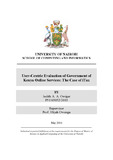| dc.contributor.author | Owigar, Judith A A | |
| dc.date.accessioned | 2016-11-16T09:30:35Z | |
| dc.date.available | 2016-11-16T09:30:35Z | |
| dc.date.issued | 2016-05 | |
| dc.identifier.uri | http://hdl.handle.net/11295/97433 | |
| dc.description.abstract | In recent years, the Kenyan government has worked to use Information and
communication technologies (ICTs) to increase openness and transparency in their
operations. These ICTs are seen as a cost-effective and convenient means to promote
public participation in government in Kenya. While many of these efforts have had a
government centered approach, the users perspective has been largely ignored. This
research takes a user centered approach and looks at how user’s perspectives and
attitudes affect adoption of e-government services. The iTax online service was
selected as a case study for this research. The research framework is based on
technology acceptance models focusing on the aspects of perceived usefulness and
perceived ease of use by the users. This view is especially important in developing
countries that are still grappling with issues of connectivity and basic infrastructure
while developing e-governance initiatives. The data was collected using
questionnaires (both paper and online), in depth interviews and a usability study
focusing on the primary task of registering on the iTax government service. Findings
indicate that the main pain point for both the government and the users is the speed of
connectivity. While user/citizens generally think that provision of e-government
services is a good idea, there is dissatisfaction with the complexity of the said egovernment
service. Findings also show that issues of access in developing countries
need to be viewed beyond infrastructure but also on service level. Service level access
looks at the extent to which the service is usable to the targeted user. Service level
access goes hand in hand with training since some users do have access to the
infrastructure but lack the know how to effectively utilize the service. This research
concludes that to increase the adoption of e-government services governments need to
focus their strategies on the needs of users, their attitudes towards to the services and
respond to these needs effectively. | en_US |
| dc.language.iso | en | en_US |
| dc.publisher | University of Nairobi | en_US |
| dc.rights | Attribution-NonCommercial-NoDerivs 3.0 United States | * |
| dc.rights.uri | http://creativecommons.org/licenses/by-nc-nd/3.0/us/ | * |
| dc.title | User- Centric Evaluation Of Government Of Kenya Online Services: The Case Of Itax | en_US |
| dc.type | Thesis | en_US |



